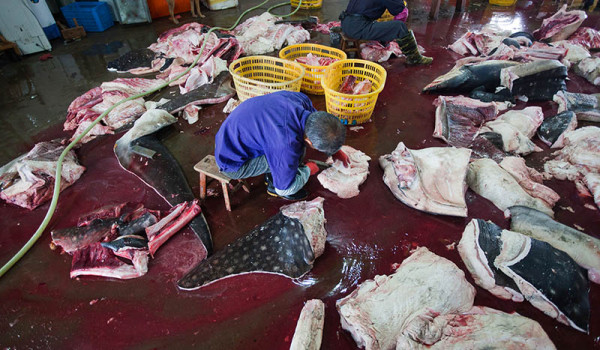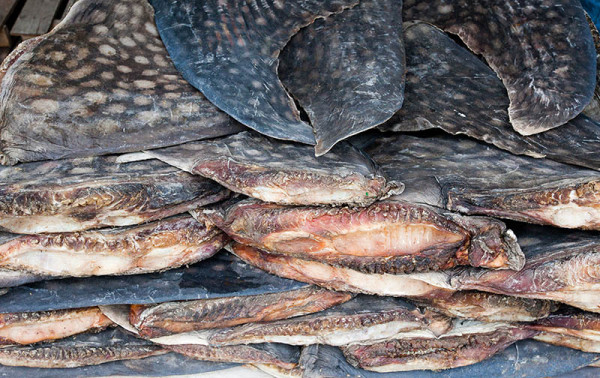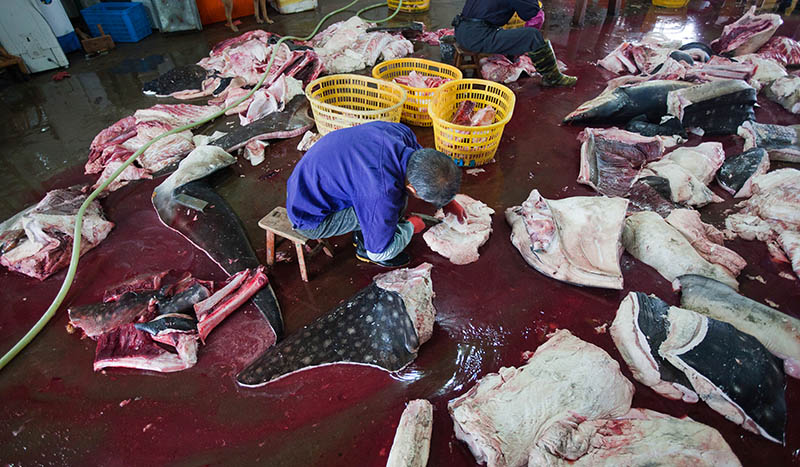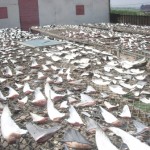Conservation NGO WildLifeRisk has put out a press release describing a slaughterhouse for sharks in China’s Zhejiang province. Shark processing is nothing new, and can be legitimate in some managed fisheries. What makes this case different is the number of animals in question, and that the targets of the processing include whale sharks, white sharks and basking sharks, all three of which are CITES listed species. CITES listing means that international trade in all or part of the species in question is illegal without special permits (say, for scientific purposes), effectively prohibiting markets for these species [NOTE: I have left in this original wording of this sentence, but please see my important edit appended at the end].

While the images, collected between 2010 and Dec 2013, clearly show one or more whale sharks being butchered, WildLifeRisk also submitted samples of “shark oil” to the lab of Mahmood Shivji at Nova Southeastern University’s Guy Harvey Research Institute for DNA based identification. The team there confirmed the presence of white shark and basking shark in the samples, but “inconclusive” for the whale shark. I called up Mahmood to ask him what that meant and he clarified that the sequence was consistent with whale shark for the supposed whale shark sample, but that the data quality wasn’t good enough to make a unequivocal ID, possibly due to the processes involved in rendering the liver down to an oil. You hardly need a confirmed DNA ID in my opinion, since no other shark has the size and spotted pattern evident from the photos.
Perhaps most damning of all, the report links to a Vimeo video apparently taken in covert fashion, wherein the proprietor of the facility and his brother describe how much whale shark, blue shark, and basking shark oil they produce in a year, where they send it and what they do with the skins. He also admits to relabeling the oil and smuggling the material overseas (specifically to Chinese restaurants and grocers in Europe), presumably to get around the CITES restrictions. He also describes receiving substantial numbers of whale sharks from Taiwan, where they have been protected for several years.
China Whale Sharks from WildLifeRisk on Vimeo.
This is one of the more appalling instances of shark exploitation that I know of, and I can’t help but be particularly appalled about the inclusion of whale sharks. As the WildLifeRisk folks point out in their release, sharks can be worth way more alive as part of the ecotourism trade than they are dead and rendered down to a bottle of oil. But putting all that aside, whale sharks and basking sharks are magnificent, peaceful, filter feeding giants, and white sharks are an awesome and misunderstood predator. All of them are among the most spectacular animals on the planet and they deserve and need our protection, especially in light of the recent IUCN report stating that a quarter of all shark and ray species are at risk of extinction. They all have low reproductive potential, which means that they are not very resilient in the face of the kind of harvest shown in this report. This isn’t a problem restricted to China, either; the whale sharks from the South China Sea may travel through the Indian and Pacific oceans, including many other countries that feature whale shark ecotourism. So, while this specific factory is on Chinese soil, this is most definitely the world’s problem and many nations have a stake.

What can we do to help remedy this sort of situation? I see three things. One comes in the form of this very important exposé from WildLifeRisk: we need to recognise and define the problem. Second, we need to enforce existing regulations that are designed to prevent this sort of tragedy. Third, we need to educate consumers so that the market forces that motivate these business practices cease to be. WildAid has had great success with their campaign “When the buying stops, the killing can too”, where they have recruited serious star power in the form of basketball star Yao Ming and others, to reduce the market for shark fin soup in Chinese traditional cuisine. Sometimes it’s as simple as getting people to realise “what’s in the bowl”. The story goes that the Chinese name for shark fin soup is “fish wing soup”, and many who consumed it had no idea from where it came. Once alerted, they stopped eating it. WildAid reports a significant success on the fin soup front, including a drop in shark fin soup consumption rates and the removal of the product from official government events. It seems that a fairly simple extension of the successful approach of WildAid might help to reduce the motivations for the sort of unconscionable slaughter revealed by WildLifeRisk. Perhaps you can spread the news to everyone you know and ask that they do the same, so that we might not need to see these sorts of disturbing images again. Who knows, maybe some of our Chinese readers can help spread the word, too, because I for one prefer this:

To this:

Are you in China and reading this? If so, we’d love to hear from you. Please chime in in the comments section with your perspectives, we value your feedback.
EDIT: I have had some queries about CITES – the Convention on International Trade in Endangered Species – so here’s my best understanding of what it means and why it is important in this case. The three species here (white, whale and basking) are all CITES Appendix II listed, which means that fishing states would have to demonstrate that any exports were derived from a sustainably-managed population and to allow exports and imports to be monitored by a third party. This effectively extinguishes most markets because the “sustainably managed population” criterion is an near impossible burden of proof when it comes to listed species, which are typically listed in the first place because they are vulnerable to or threatened with extinction. Moreover, CITES listed products cannot be monitored effectively when mixed with other species and smuggled, as admitted in the video. I think we can safely assume that “smuggle” in this case means that they didn’t have a CITES export permit from the Chinese government, which is a signatory to the CITES treaty. I’ve done CITES export permitting for scientific samples from whale sharks, although not from China, and it was neither simple nor straightforward.







Unless China has a law against slaughtering these species, or he’s acting w/o a permit …. it’s not illegal.
CITES doesn’t restrict domestic market in any form whatsoever. It only restricts international trade, and in this case — being Appendix II — it just means he needs permission from Chinese gov to export legally.
When they are caught in international waters, it is illegal…period.
Why are these people so stupid…I just don’t understand. Do these people have any understanding of “don’t sh&t where you eat?” Have some respect for the world around you for crying out loud. If not that, at least have an ounce of self respect.
The admission in the video of mixing CITES listed species in with others and relabeling and smuggling into Europe makes it very much illegal, as does receiving whale sharks from Taiwan, where they are now protected. The sheer number of animals involved simply makes it unconscionable.
I wonder what can be done against this… Boycotting chinese restaurants?
Which of these shark species are CITES Appendix I ?
Appalling but not shocking. Reading the brief overview of the fishery and bycatch of this species in Rowat & Brooks (2012), it is obvious that large scale killing of these animals is bound to be happening. E.g. “In the mid 1990s, the Philippines processed between 450 and 799 R. typus per year”. While reported fisheries have apparently declined the authors note: “The perceived value of R. typus fins for display purposes, however, appears to have increased over the years”. Where there is a market demand there will be supply, one way or another.
Your suggestion to tackle the demand is surely the most practical since regulations seem to be having little effect.
Rowat & Brooks (2012) A review of the biology, fisheries and conservation of the whale shark Rhincodon typus. J Fish Biology 80, 1019–1056 (2012).
None of them is Appendix I, but all three species (white, whale and basking) are Appendix II
My 13-year old daughter wants to study whale sharks when she grows up. Given the pace of the whole-sale slaughter by China and Taiwan, I wonder if there isn’t enough time left for that dream to come true. It’s depressing to think that governments condone this greedy, unrestrained liquidation of nature.
CITES is very clear that species listed under Appendix II are not necessarily threatened with extinction (but may become so if international trade is not strictly controlled). Appendix I listing is meant to amount (essentially) to a ban on international commercial trade, but Appendix II can be used to ensure international trade is sustainable.
Several CITES Parties have opted out of the shark listings (through “Reservations”), but China is not among them. In this case, the onus is on China to demonstrate that exports of listed species are sustainable and legal. If they are exporting without such findings, they are violating their CITES obligations. Unfortunately, this part of the process (whether such a determination has been made and/or how conclusions were reached) is not currently open to as much public scrutiny as one might think. Of course, it is hard to believe that this level of take could be sustainable for such inherently vulnerable species. There are ways to address this issue through CITES.
The Chinese national whale shark protection reportedly allows exceptions with special permits. Whether take by Chinese vessels/in Chinese waters is illegal depends on who has the permits and what they’re allowed to do under them. The Wildlife At Risk team seems to think those terms have been violated as well and they are likely quite familiar with the Chinese rules.
Overall, the disturbing findings of this important investigation remind us that proper national implementation is vital to the success of international conservation agreements, and that following-up is as important as getting the commitments.
Fantastic info Sonja, thanks! Everyone else reading, you should listen to Sonja, she knows what she’s talking about.
For those not familiar with Sonjas work: http://www.sharkadvocates.org/sonja_fordham.html
Thanks for covering this issue and for welcoming added comments.
Just saw this in National Geographic reporting on the story http://bit.ly/1nmGadV:
A statement by the Bureau of Fisheries—which is under China’s Ministry of Agriculture—in the South China Morning Post noted that “the hunting and sale of the three shark species was illegal on the mainland and punishable by a fine or jail sentence.”
It’s not just China. One of the companies identified by the NY Times as buying the whale shark parts is Omojo, which is based in Washington State. Their products are carried by Drugstore.com, Walgreens, and Target, and places like Vitamin World sell other brands of shark oil (with no specified species). There are American consumers and businesses that need to be educated and reached as well.
Links:
http://sinosphere.blogs.nytimes.com/2014/01/28/mass-slaughter-of-vulnerable-shark-species-in-china-wildlife-group-says/?smid=tw-share
http://omojohealthusa.com/where_to_buy.php
http://www.drugstore.com/omojo/qxb83586
http://www.walgreens.com/search/results.jsp?Ntt=omojo&x=0&y=0
http://www.target.com/s?searchTerm=omojo&category=0%7CAll%7Cmatchallpartial%7Call+categories
http://vitamins.vitaminworld.com/search?w=shark&x=0&y=0
Completely.Stomach.Turning.
But not surprising.
I get so sad when I read things like this….
I live in China and unfortunately there is still shark fin soup on the menu in many of the more “fancy” Chinese restaurants.
It’s also not unusual to see shops with dried shark fins here in Asia. Last time I saw one with a huge stock of fins was in Hong Kong 2 months ago.
And yet this is on Omojo’s website. Sounds like they need to reexamine the long view and what good environmental practices are.
» We believe in sustainability
taking the long view. not compromising today for tomorrow. knowing that good environmental and social practices = good business.
you could try but it probably wont stop the whole thing completely